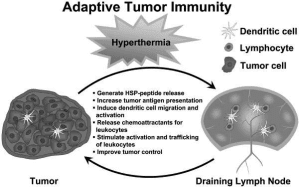The combination of immunotherapy with hyperthermia for treating cancer has been shown to have significant clinical effects.
 The accepted view of the cancer-host immune interface is that tumors possess unique antigens that can be recognized by the immune system.
The accepted view of the cancer-host immune interface is that tumors possess unique antigens that can be recognized by the immune system.
After antigen uptake at tumor sites, APCs have the ability to create a robust response by entering lymphoid compartments and programming lymphocytes. Following generation and expansion to large numbers, cytotoxic lymphocytes then traffic to tumor sites for targeted cell killing.
To understand how temperature may influence the immune system, it is necessary to define the concept of hyperthermia.
As the father of clinical thermometry, Wunderlich is credited with defining normal body temperatures at 37°C and describing a dynamic range of normal body temperatures with diurnal variations. Fever induces the elevation of the physiological set point of body temperature, increasing core body temperatures via specific thermo-effectors. Hyperthermia differs fundamentally from fever in that it elevates the core body temperature without changing the physiological set point.